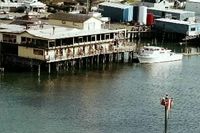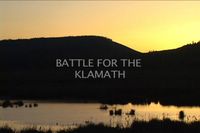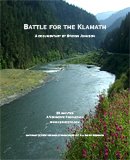Battle for the Klamath was accepted into the International Documentary Festival in Amsterdam's Docs for Sale program as a rough cut. The film should be finished in the next month and then begin a festival run with an eye toward a television sale.
Watch the trailer from the film.
Friday, November 11, 2005
Wednesday, October 19, 2005
Friday, September 30, 2005
ESA bill passes in the House
A scene in the the documentary takes a look at a July 2004 anti-ESA demonstration in Klamath Falls, OR where proponents of this bill held a hearing and demonstration.
The bill to "revise" the Endangered Species Act passes the House, 229 to 193. The bill's main sponsor is Richard Pombo, (CA-R), from the central valley town of Tracy, a booming bedroom community over the Oakland Hills from the Bay Area. More on the bill from the New York Times:
http://www.nytimes.com/2005/09/30/politics/30species.html?pagewanted=print
The legislation won't get through the Senate in its current form, but the negotiations (and probable weakening) of the ESA have begun. Count how many times the phrase "best available science" is used by proponents of this bill in the coming months. That's code for "gut the ESA."
The bill to "revise" the Endangered Species Act passes the House, 229 to 193. The bill's main sponsor is Richard Pombo, (CA-R), from the central valley town of Tracy, a booming bedroom community over the Oakland Hills from the Bay Area. More on the bill from the New York Times:
http://www.nytimes.com/2005/09/30/politics/30species.html?pagewanted=print
The legislation won't get through the Senate in its current form, but the negotiations (and probable weakening) of the ESA have begun. Count how many times the phrase "best available science" is used by proponents of this bill in the coming months. That's code for "gut the ESA."
Tuesday, September 27, 2005
Thursday, September 15, 2005
The Republican War on Science

Republican War on Science
Chris Mooney's book,The Republican War on Science, has a chapter entitled "Fishy Science" that covers many of the issues that are in Battle for the Klamath. The effort to rewrite the Endangered Species Act, Mike Kelly's whistleblower case, and the 2002 fish kill are all there in a book that lays out the systemic undermining of the scientific community under the Bush Administration.
The fight over water and fish in the Klamath River is a small story in this overall war, but it has many elements that make it the perfect example of political power colliding with regional environmental interests. Check out the book and make your own judgement about Mooney's findings.
Tuesday, September 06, 2005
Farmers lose court battle in Klamath Basin
A big blow to farmers in the Klamath Basin. This decision stems from the 2001 water shutoff controversy.
Tuesday, August 09, 2005
Dinosaur discovery
Mike Kelly, a fisheries biologist and one of the primary characters in Battle for the Klamath, is also an amateur paleontologist. He and a friend made a significant discovery in Oregon. Read the story.
Monday, August 08, 2005
Wednesday, July 27, 2005
Fish die-off on upper Klamath
Another fish kill on the Klamath, this time on the Upper River. It appears this kill is due to high temps in the Upper Basin and is not as devastating as the 2002 kill on the Lower River, but the death of young fish is a great concern to the biologists working the Klamath, for obvious reasons.
Wednesday, June 29, 2005
Wednesday, June 08, 2005
Tribes face fishing closure

Yurok Fisherman
This article from Indian Country Today explains how the restrictions on salmon fishing in the Klamath River apply not only to commercial and recreational fishermen up and down the coast, but also to the Indian tribes, particularly the Yurok tribe at the mouth of the river.
I spent a couple of days on the river with Yurok tribal fishermen, filming them fishing and talking to them about the 2002 fish kill and what the salmon mean to the tribe. Troy Fletcher, quoted in the story above, plays a large role in the documentary, explaining the Yurok's position in the ongoing controversy.
Tuesday, May 24, 2005
Chipping away at the Endangered Species Act
New Rule on Endangered Species in the Southwest - New York Times
This article in the New York Times is an example of the ongoing effort to chip away at the Endangered Species Act, a priority for some GOP members of Congress and certain factions in the Interior Department.
The example here takes place in the Southwestern U.S., but it builds on a ruling in Oregon regarding the endangered Coho salmon. The gist of the Oregon ruling, made by a judge, not a scientist, was that there was not much difference genetically between wild and hatchery raised salmon, so they all should be counted together. Every scientist I've talked to about this is outraged, usually after they stop shaking their head and laughing at the lack of sense in the ruling.
Once again, these issues are covered extensively in the documentary, where I talk to fishery biologists, government officials and environmentalists. I also covered a Congressional hearing about the Endangered Species Act last summer that took place in Klamath Falls, OR. An interesting event.
This article in the New York Times is an example of the ongoing effort to chip away at the Endangered Species Act, a priority for some GOP members of Congress and certain factions in the Interior Department.
The example here takes place in the Southwestern U.S., but it builds on a ruling in Oregon regarding the endangered Coho salmon. The gist of the Oregon ruling, made by a judge, not a scientist, was that there was not much difference genetically between wild and hatchery raised salmon, so they all should be counted together. Every scientist I've talked to about this is outraged, usually after they stop shaking their head and laughing at the lack of sense in the ruling.
Once again, these issues are covered extensively in the documentary, where I talk to fishery biologists, government officials and environmentalists. I also covered a Congressional hearing about the Endangered Species Act last summer that took place in Klamath Falls, OR. An interesting event.
Wednesday, May 18, 2005
Lots of rain lately in the Upper Klamath Basin ...
Could mean some relief for the irrigation season and downstream flows.
Friday, May 13, 2005
Members of Congress seek disaster relief for fishermen.

Fort Bragg Fishing Fleet
Mike Thompson, the Congressman for the North coast of California and a critic of the federal government's role in the Klamath water diputes, is pushing for diaster relief to help the commercial fishermen and the lower river Indian tribes. He's also a character in the documentary, and speaks forcefully not only about the damage to the Yurok tribe's fishery, but also the economic impact on small businesses throughout the northern California coastal region.
Democrats seek disaster declaration over salmon restrictions
Tuesday, May 10, 2005
NPR takes a look at the Upper Klamath Basin
Here's a NPR report on the drought problems in the Upper Klamath Basin this Spring. Farmers are skittish because of the dry winter and the threat of another water curtailment similar to what took place in 2001.
The Bureau of Reclamation guy who's quoted in the story, Dave Sabo, and the farmer Steve Kandra, are both characters in the documentary.
The Bureau of Reclamation guy who's quoted in the story, Dave Sabo, and the farmer Steve Kandra, are both characters in the documentary.
More issues for commercial fishermen in CA
Salmon fishery protections unnerve commercial fishermen.
Consequences from both the 2002 fish kill and the die-off of juveniles heading out to sea. Zeke Grader, a chracter in the documentary, predicted this when I interviewed him almost a year ago.
Consequences from both the 2002 fish kill and the die-off of juveniles heading out to sea. Zeke Grader, a chracter in the documentary, predicted this when I interviewed him almost a year ago.
Thursday, April 28, 2005
Thursday, April 21, 2005
It's not just about the fish...
This story is a look at the problems the farmers in the Upper Klamath Basin face this growing season. The documentary looks at both the struggle of the farmers in the Upper Basin to survive with a limited water supply and the Indian tribes and fishermen of the Lower Basin to survive with limited fish.
Two of the people quoted in the article, Dave Sabo of the Bureau of Reclamation, and Steve Kandra, a local farmer, are characters in the film.
Two of the people quoted in the article, Dave Sabo of the Bureau of Reclamation, and Steve Kandra, a local farmer, are characters in the film.
Mystery on the Columbia River
This story takes place up the coast on the Columbia, but it confirms the fears of some biologists of a sharp drop in salmon this year up and down the west coast. The Klamath River and its tributaries had the lowest number of returning salmon last fall since they started keeping records.
Wednesday, April 20, 2005
Tuesday, April 19, 2005
Welcome
I'm setting up this blog to follow the progress of my feature-length documentary Battle for the Klamath, about the ongoing fight between small farmers and the Bush Administration on one side and Indian tribes, commercial fishermen and environmentalists on the other, over endangered salmon and water rights in southern Oregon and Northern California.

Chinook Salmon
The 59 minute documentary is currently in "fine cut" form and is being submitted to film festivals. A recent grant from the Pacific Pioneer Fund will help with a sound mix and color correction. Additional funds are sought for marketing and distribution.
For more information, email info@veriscope.com
Here's the synopsis of the film:
The Klamath River, snaking through southern Oregon and northern California through some of the most pristine wilderness remaining in the west, is the focus of an intense battle over fish, water and conflicting ways of life, between upstream farmers and the Bush Administration on one side, and downstream Indian tribes, commercial fishermen and environmentalists on the other.
In 2001, a bitter conflict erupted over the use of the limited supply of water that flows down the Klamath River, a major spawning basin for endangered Coho salmon. The farmers supply of water was ordered cut and the water went downriver to help the salmon and the Indian tribes.
Then, in 2002, after Karl Rove and the Bush Administration intervened, the upstream farmers received the available water for their crops and the downstream communities suffered the worst fish die-off in U.S. history, when over 30,000 salmon died in the lower portion of the Klamath River as they attempted to swim upriver to spawn. Many experts believe the cause of the massive fish kill was the lack of water flow that is controlled by the United States Bureau of Reclamation at the headwaters of the river in Oregon. Too little water released upriver causes low level and warmer water conditions that prove hazardous to spawning salmon.
When salmon are wiped out in such large numbers downstream there is a major impact on the regional Indian tribes, the Yurok, Hupa and Kurok, who depend on the salmon fisheries as a source of food and income. Likewise, commercial fishermen along the coast are devastated and local economies impacted by the steady decline of the salmon.
Yet that water is also promised to the small farmers in the Klamath Valley in Oregon, who depend on it to irrigate their crops. Many of these farmers are descendants of homesteading veterans of World War One who were promised the land and water to farm their crops forever.
Battle for the Klamath examines why a regional fight over water and fish in 2001 and 2002 caused the Bush Administration and its political Svengali, Karl Rove, to intervene in determining how much water flows down an obscure western river, and how that exertion of political influence caused a veteran government fisheries biologist to file a whistleblower complaint against his own agency because he feared the endangered salmon faced extinction. The hour long documentary also listens to tribal fishermen, fisheries biologists and small farmers as they explain how their way of life is threatened by too much demand for too little water – a problem that more and more communities will face in the future.

Chinook Salmon
The 59 minute documentary is currently in "fine cut" form and is being submitted to film festivals. A recent grant from the Pacific Pioneer Fund will help with a sound mix and color correction. Additional funds are sought for marketing and distribution.
For more information, email info@veriscope.com
Here's the synopsis of the film:
The Klamath River, snaking through southern Oregon and northern California through some of the most pristine wilderness remaining in the west, is the focus of an intense battle over fish, water and conflicting ways of life, between upstream farmers and the Bush Administration on one side, and downstream Indian tribes, commercial fishermen and environmentalists on the other.
In 2001, a bitter conflict erupted over the use of the limited supply of water that flows down the Klamath River, a major spawning basin for endangered Coho salmon. The farmers supply of water was ordered cut and the water went downriver to help the salmon and the Indian tribes.
Then, in 2002, after Karl Rove and the Bush Administration intervened, the upstream farmers received the available water for their crops and the downstream communities suffered the worst fish die-off in U.S. history, when over 30,000 salmon died in the lower portion of the Klamath River as they attempted to swim upriver to spawn. Many experts believe the cause of the massive fish kill was the lack of water flow that is controlled by the United States Bureau of Reclamation at the headwaters of the river in Oregon. Too little water released upriver causes low level and warmer water conditions that prove hazardous to spawning salmon.
When salmon are wiped out in such large numbers downstream there is a major impact on the regional Indian tribes, the Yurok, Hupa and Kurok, who depend on the salmon fisheries as a source of food and income. Likewise, commercial fishermen along the coast are devastated and local economies impacted by the steady decline of the salmon.
Yet that water is also promised to the small farmers in the Klamath Valley in Oregon, who depend on it to irrigate their crops. Many of these farmers are descendants of homesteading veterans of World War One who were promised the land and water to farm their crops forever.
Battle for the Klamath examines why a regional fight over water and fish in 2001 and 2002 caused the Bush Administration and its political Svengali, Karl Rove, to intervene in determining how much water flows down an obscure western river, and how that exertion of political influence caused a veteran government fisheries biologist to file a whistleblower complaint against his own agency because he feared the endangered salmon faced extinction. The hour long documentary also listens to tribal fishermen, fisheries biologists and small farmers as they explain how their way of life is threatened by too much demand for too little water – a problem that more and more communities will face in the future.
Subscribe to:
Posts (Atom)




